
Latest News Regarding
Horn of Africa
Saudi Arabia concludes military drill with Red Sea countries
Saudi Arabia concludes military drill with Red Sea countries
Source: The Defense Post
By JOE SABALLA
Tuesday June 7, 2022
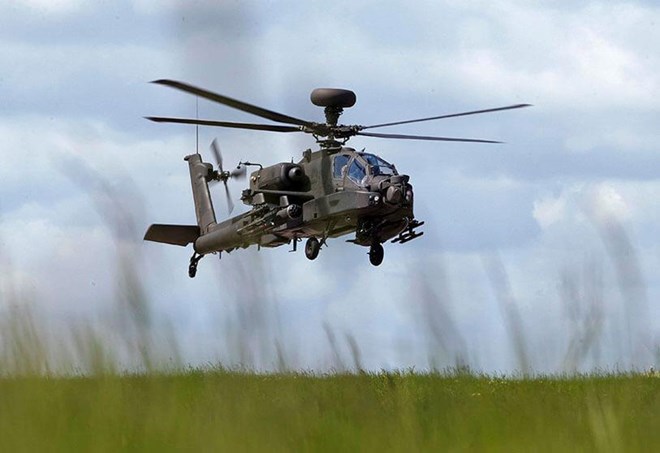
The Kingdom of Saudi Arabia has concluded a five-day joint military drill with Red Sea coastal countries Djibouti, Jordan, Egypt, Sudan, Yemen, and Somalia.
Dubbed “Red Wave-5,” the aim of the drill was to strengthen military cooperation and enhance the maritime security of countries bordering the region.advertisementsIt also allowed participating military units to exchange combat experiences to increase their readiness in addressing various maritime security issues.
“The Red Wave-5 maneuver witnessed implementing a number of combat training, citing the clearance of fortified sites, intrusion, and live fire shooting in support of combat aircraft and helicopters…” the Saudi Press Agency reported.
As part of the drill, naval units carried out counter-attacks against simulated enemy speedboats to protect vessels loaded with important cargo.
Saudi Arabia and its allies also reportedly utilized Apache helicopters to conduct aerial maneuvers for the first time since the exercise was launched in 2019.
Power Trials Commence at Grand Ethiopian Renaissance Dam Despite Stalled Negotiations and Regional Tensions
Source: By Steve Floyd Thursday, May 19, 2022, 8:01 AM

The Grand Ethiopian Renaissance Dam. (Ana E. Cascão, https://flic.kr/p/2m7jj5o; CC BY-NC 2.0,https://creativecommons.org/licenses/by-nc/2.0/)
On Feb. 20, Ethiopian Prime Minister Abiy Ahmed visited the Grand Ethiopian Renaissance Dam (GERD) to celebrate initial power generation trials. Ethiopians rejoiced as their decades-old dream neared completion. For years, the previous government described the dam as a “weapon” in Ethiopia’s war on poverty, a critical step toward environmental justice and an opportunity to undo Egypt’s “hydro-hegemony.” With funding from civil servant donations, diaspora support and the sale of bonds to private citizens, the GERD has become a symbol of national pride. Hashtags like #ItsMyDam, #GERDisYourDam and #EthiopiaPrevails trended this winter, and people across Africa praised the milestone on social media. The trials will produce 700 megawatts (MW) of electricity, but the dam will generate 5,150 MW once filled to capacity. Such sustainable power will prove a boon for Ethiopia’s economy, bring U.N. Sustainable Development Goals within reach and benefit the broader region.
But enthusiasm for the project is far from universal. Negotiations with Sudan and Egypt remain at an impasse, and these two downstream states have condemned Ethiopia’s decision to begin filling the dam without a binding agreement on water sharing. In a region beset with political turmoil and armed conflict, stalled negotiations heighten instability and increase the potential for conflict. Saber rattling and bellicose statements often punctuated the 10-year negotiations, and multiple crises now exacerbate this rhetoric. The region may soon experience extreme hunger after three seasons of drought. Ethiopia’s Tigray conflict has created a humanitarian disaster. And the presence of 55,000 Ethiopian refugees compounds Sudan’s domestic challenges. Moreover, clashes between Ethiopian militias and Sudanese troops over the disputed al-Fashqa border region turned lethal in 2021, and there is speculation that Egypt could provide support to Tigrayan forces. Such dynamics imbue the region with exceptional volatility and complicate negotiations. As Ethiopia prepares for a third filling in summer 2022, the GERD dispute will further inflame these interlocking tensions. Absent a negotiated agreement, the potential for conflict looms.
Overview of the Dispute
Spanning more than 4,000 miles, the Nile River winds across nine borders before it empties into the Mediterranean Sea. Yet the Nile’s length belies its relatively small volume. Furthermore, 86 percent of its capacity originates in the “Blue Nile” of Ethiopia’s highlands. Waters flowing from the Blue Nile are critical for downstream economies, as they irrigate crops, support fisheries and attract tourists. In fact, for many rural communities downstream, the river constitutes the sole source of economic activity. But the Blue Nile also presents the potential for abundant hydroelectric power. And it is this prospect that has engendered protracted disputes between upstream and downstream states.
With a projected cost of $5 billion, the GERD will create a 74 billion cubic meters (bcm) reservoir 20 miles from the Sudanese border. Ethiopian Electric Power Corporation, which owns and operates the GERD, expects the dam to generate more than 5,000 MW of electricity once operational. When negotiations failed to produce an agreement on rights and usage, Ethiopia unilaterally began to fill the dam in July 2020. A second phase of filling occurred in July 2021, and the dam has now stored 13.5 bcm of water.
The significance of this project for Ethiopia’s economic growth and development is not easily overstated. In 2016, Ethiopia had approximately 2,300 MW of installed generation capacity, and, as of 2019, the World Bank estimates that half of its population lacks regular access to electricity. Such abundant power would help Ethiopia achieve the U.N. Sustainable Development Goal for affordable, accessible energy, and the dam could provide surplus electricity to the broader region.
But downstream states do not share this rosy assessment. Due to the Nile’s importance for the Sudanese and Egyptian economies, leaders in both countries grew concerned when Ethiopia initiated construction in 2011. For if Ethiopia fills the GERD to capacity, the stored water will equal 18 months’ worth of the Blue Nile’s flow. Egyptian and Sudanese citizens rely on the Nile for fresh water, and their agriculture depends on extensive irrigation networks. Both states fear that the dam could disrupt water flows, increase salinity levels and harm agricultural production. Indeed, the first GERD filling in July 2021 disrupted Khartoum’s water supply for three days, and irrigation pumping stations faced sudden shortages.
Moreover, both downstream states operate their own hydroelectric dams and require steady, consistent flows to meet their power needs. As Sudan is closer to the GERD, it is also concerned that increasing sediment levels or the rapid release of stored water could physically damage its smaller dams at Merowe and Roseires. For these reasons, Khartoum and Cairo expressed grave concern over Ethiopia’s decision to unilaterally fill the dam without an agreement. In April 2021, Egyptian President Abdel Fattah al-Sisi warned of “inconceivable instability in the region” if the GERD affected Egypt’s water supplies.
History of Negotiations
Trilateral talks, mediated by the U.S., opened soon after dam construction began, and initial efforts proved promising. In 2011, representatives from each country formed an International Panel of Experts (IPOE). When the panel submitted its report two years later, it called for joint studies to further explore technical issues. The states then agreed to a Declaration of Principles in 2015. Reflecting the principles of the 1997 U.N. Convention on the Law of the Non-Navigational Uses of International Watercourses (U.N. Convention), the parties committed to the “equitable and reasonable utilization” of the river’s resources, acknowledged the “obligation not to cause significant harm,” and vowed to exchange data and information. Following the IPOE’s recommendation, the parties also agreed to establish a Tripartite National Committee (TNC) to conduct joint studies and solicit technical assessments from international consultants. Under the Declaration of Principles, the countries would provide the TNC with technical data needed to study water usage and establish safe operating parameters. Most importantly, all three states agreed to abide by the TNC and IPOE recommendations.
Unfortunately, despite the declaration’s aspirational language, subsequent negotiations bore little fruit. The TNC engaged international consultants to conduct technical assessments, but the parties could not agree on baseline terms of references for the analysis. In 2018, the three states established a National Independent Scientific Research Group (NISRG) to assess the dam’s hydrological, environmental and social impacts, but consultations broke down a year later without consensus.
Ultimately, Ethiopia walked away from the negotiations in February 2020. Abiy rejected a draft agreement prepared with the World Bank’s technical input, and Ethiopia unilaterally commenced filling the dam in July 2020. The African Union (AU) sponsored a new round of negotiations; however, these efforts ended in April 2021 without any breakthrough, and Sudan refused to sign the draft final communique. When Ethiopia conducted a second filling in July 2021, Egypt referred the matter to the U.N. Security Council over Ethiopia’s objections. In September 2021, the Security Council issued a statement in which it “encouraged” the states “to adhere to their obligations” under international law and reach a “binding agreement on the filling and operation of the GERD.” But little has changed on the ground, and fundamental disagreements remain. As Ethiopia intends to conduct a third filling in summer 2022, Egypt and Sudan fear they may soon face a fait accompli. Tensions remain high, and mutual recriminations continue.
Party Positions and Negotiating Hurdles
Regional leaders often speak of the Nile in poetic terms. Former Ethiopian Prime Minister Meles Zenawi once called the river “the umbilical cord that connects” the region. In an April 2021 letter to the U.N. Secretary Council, Sudan described the Blue Nile as “an inseparable part of the history, culture, economy, and conscious[ness]” of the region’s people. At times, the parties’ positions have matched this lofty rhetoric. Meles regularly extolled the GERD as a tool for regional economic growth, and Sudanese President Omar al-Bashir recognized Ethiopia’s right to upstream development in 2012. But Sudan’s support soured when Prime Minister Abiy cast the dam in more nationalistic terms. The parties are now at odds, and each side assigns blame to the other. Five key issues currently impede a negotiated solution:
- Binding commitments for droughts. Egypt and Sudan desire clear commitments to ensure sufficient water is released during droughts or periods of low rainfall—something Ethiopia is reluctant to do. The parties have agreed on what constitutes a drought, but Ethiopia will not commit to release specified amounts of water. More broadly, Egypt and Sudan demand that all negotiated commitments be binding, while Ethiopia will commit only to voluntary guidelines and a nonbinding dispute resolution mechanism.
- Timeline for filling the GERD. A slower timeline will minimize the disruption for downstream users, but it would deprive Ethiopia of cheap, renewable energy for its people and economy. Although two fillings are complete, Ethiopia has previously expressed a willingness to fill the reservoir over a seven-year period and delay completion until 2027. Egypt, however, has argued that the reservoir be filled over an even longer period, possibly lasting 12 to 21 years. Analysts estimate that if the GERD remained offline for more than 12 years, Ethiopia would lose tens of billions of dollars in revenue.
- Role of mediators. In 2020, Sudan requested that the EU, U.S. and U.N. mediate negotiations alongside the AU to “narrow the gap” among the parties. According to Sudan, such a quartet would add credibility to parties’ assurances and guarantees. Ethiopia, however, rejects third-party mediation as outside the scope of the 2015 Declaration of Principles. Moreover, U.S. and EU influence with Addis Ababa remains at a nadir due to criticism over the Tigray conflict.
- Scientific and technical assessments. Under the 2015 declaration, the three nations pledged to provide data to the TNC. Such information would support studies to establish a technical baseline that addressed each parties’ concerns, like how filling will affect the accumulation of salts in agricultural lands. Egypt claims that Ethiopia failed to provide the necessary data, though Ethiopia dismisses these complaints. Furthermore, Ethiopia argues that the 2013 IPOE report already established that the GERD will not harm downstream states. But Egypt and Sudan note that the panel’s report was not conclusive, and it actually recommended a “comprehensive study” to model downstream effects. Although the NISRG sought such technical answers, it disbanded without forging a consensus on technical issues.
- Prior water-sharing agreements. Existing treaties and legacy colonial agreements also complicate negotiations. The Anglo-Egyptian Treaty of 1929, along with a 1959 bilateral treaty between Sudan and Egypt, effectively allocated all water rights to the two downstream states and granted Egypt a veto over upstream projects. While Egypt and Sudan expressly recognized Ethiopia’s right to exploit the Blue Nile in the 2015 declaration, both states still view these treaties as binding international agreements. Ethiopia, however, rejects any agreement that indirectly recognizes these treaties, as it was not a party to those negotiations. As a compromise, Sudan offered to include a clause stating that the agreement does not constitute recognition of any legacy treaties by any signatory.
Such issues contributed to the breakdown of talks in April 2021, and changing domestic dynamics have complicated negotiations further. As Abiy confronts prolonged conflict and growing ethnic tensions at home, the GERD presents an opportunity to unify the state with nationalist rhetoric. But such language may have driven Sudan’s military leadership to align more closely with Egypt, adding to the general climate of mistrust.
The Potential for Conflict
Transboundary water disputes implicate core national interests: the use of natural resources, the potential for socioeconomic development and the fear of environmental degradation. In many cases, disputed waters are also powerful symbols that loom large in the national consciousness. For Ethiopia, Sudan and Egypt, the Nile carries this potent strategic and emotional mix. Such sentiments constrain policy options, calcify hardline positions and increase the chance of diplomatic failure. In these situations, armed conflict becomes a distinct possibility.
Each side has employed belligerent rhetoric in recent years. In April 2021, Sudan’s foreign minister feared that Ethiopia sought to “impose a fait accompli and put all the peoples of the region in grave danger.” Sudan’s irrigation minister then decried Ethiopia’s decision to unilaterally fill the dam a second time, warning that “Ethiopian intransigence would lead Sudan into all possible options to protect its security and its citizens.” Similarly, many observers have interpreted various Egyptian statements as veiled threats of war, especially as Cairo allegedly requested that Khartoum permit Egyptian commandos to conduct a strike from Sudanese territory should negotiations fail. In 2013, then-President Mohamed Morsi declared that “Egypt’s water supply cannot be violated at all” and warned that “all options are open.” Two months later, Egyptian ministers were unknowingly recorded on live television while discussing the situation. In the recording, ministers proposed that Egypt destabilize Ethiopia with military aid to the Oromo Liberation Front and spread rumors about bombing the dam. In March 2021, President al-Sisi declared the Nile’s water a “red line” and “untouchable.” For its part, the chief of Ethiopia’s Air Force recently extolled Ethiopia’s military capabilities, threatening multiple plans “to counter an enemy who knowingly … attempts to derail the [GERD] project.”
Such aggressive words can incite public passions and limit leaders’ policy choices when crises arise. Some rhetoric may be mere posturing, and President al-Sisi has downplayed talk of military options. But a region wrestling with political turmoil, civil conflict and famine can ill afford additional volatility. Furthermore, the climate of mistrust bleeds into other areas of tension, such as Ethiopia-Sudan border disputes and Addis Ababa’s fear of Egyptian support to Tigrayan separatists. The need for a diplomatic solution is pressing.
International Law and the Importance of Shared Facts
International law does provide guidance for transboundary water disputes. For instance, the 1997 U.N. Watercourse Convention requires states to ensure “equitable access” to transboundary waterways and avoid causing “substantial harm.” The International Court of Justice (ICJ) has reinforced these same principles. In Pulp Mills on the River Uruguay (Argentina v. Uruguay), the ICJ emphasized that parties must seek the “equitable utilization” of the river’s resources and respect other riparians’ “rights of economic development.” Similarly, in Gabčíkovo-Nagymaros Project (Hungary/Slovakia), the ICJ found that Czechoslovakia’s unilateral control of the Danube deprived Hungary of its “right to an equitable and reasonable share of … natural resources” and highlighted the ecological effects of diverting upstream waters. But equity and harm are meaningless concepts without a mutually accepted technical baseline.
In the Blue Nile Basin, equity requires an understanding of water flows during periods of drought and the potential impact of climate change. Similarly, any appreciation of harm must assess preexisting sediment levels and consider how decreased water flow can affect downstream salinity. Such analysis is critical for settling transboundary water disputes. Indeed, the ICJ conducted its first fact-finding mission in 50 years for the Hungary/Slovakia case. And in Argentina v. Uruguay, the court deemed environmental impact assessments a requirement under international law. But such findings are even more vital in a region acutely vulnerable to climate change. To establish a scientific baseline will require time, expertise and cooperation, and it is imperative that the parties reengage on these technical issues.
Agreement on technical terms of reference could jump-start negotiations, while additional data on water flows, sedimentation, salinity levels and projected power output could help parties quantify the benefits of cooperation and allay public fears. For instance, in a 2021 study, environmental scientists at the University of Virginia, Chapman University and Egypt’s Alexandria University used commercial satellite imagery to study the effects of rainfall and runoff on the broader Blue Nile basin. After tracking water levels during GERD filling, their analysis suggested that the GERD could exacerbate drought during periods of low rainfall. This is precisely the type of data the parties agreed to research and share under the 2015 Declaration of Principles. The AU, EU and U.S. should pressure each state to follow through on this commitment and support technical exchanges that build on objective, third-party analyses.
The Road Ahead
The benefits of an agreement could not be greater. Successful negotiations would defray tensions in an increasingly volatile region. But it could also promote resilience for cyclical droughts and provide sustainable power for an energy-starved region. Addisu Lashitew, a research fellow at the Brookings Institution, and Haim Kassa, a professor at Miami University, have noted that power interruptions decrease Ethiopian, Egyptian and Sudanese business revenue by, respectively, 6.9 percent, 6 percent and 1.2 percent annually. More consistent power would bolster economic performance, create jobs and reduce poverty for all three states. Such shared benefits could enable leaders to garner public support for compromise and dial down the bellicose rhetoric. Despite these possibilities, negotiations remain at an impasse, and a third unilateral filling is scheduled for summer 2022.
The international community has not remained silent. When Ethiopia walked away from the U.S.-led negotiations in 2020, Secretary of the Treasury Steven Mnuchin, who hosted the talks, urged Ethiopia not to fill the GERD unilaterally. Once Ethiopia chose to proceed, the Trump administration paused $100 million in aid. More recently, President Biden has acknowledged Egypt’s concerns and reiterated the U.S. interest “in a diplomatic resolution that meets the legitimate needs” of all three states. Similarly, the EU has urged all parties to establish a clear road map for renewed negotiations, emphasized the importance of an agreement for foreign investment and extolled the potential benefits for the basin’s 250 million people. And after the second filling in 2021, the U.N. Security Council explicitly called on all parties to resume negotiations. But such calls are unlikely to change the parties’ hardened positions, and a negotiated solution may ultimately prove elusive.
Continued international pressure remains critical. On Jan. 25, David Satterfield, the U.S. special envoy for the Horn of Africa, met with the Egyptian foreign minister and discussed the stalled negotiations. On March 21, he then traveled to Ethiopia for consultations about the Tigray conflict with U.N., AU and Ethiopian officials. Unfortunately, tension over Sudan’s military coup and Ethiopia’s operations in Tigray may limit U.S. leverage with Khartoum and Addis on other issues. Moreover, Satterfield has announced that he will step down in May after only four months on the job, creating a diplomatic gap that could impede U.S. engagement. Nevertheless, Ethiopia appointed Seleshi Bekele as ambassador to the United States in March. As Seleshi previously served as Ethiopia’s minister of water, irrigation and energy and as the chief negotiator for the GERD, his selection may indicate a renewed willingness to engage on the GERD and curry U.S. support. That said, where Brussels and Washington lack influence, they should work through the other regional actors to incentivize cooperation. Pressure from other upstream states and influential Arab League members like the United Arab Emirates could encourage the parties to establish technical terms of reference, facilitate scientific exchange and reengage in good-faith negotiations. Such steps would provide confidence-building measures and jump-start the stalled negotiations.
Ultimately, the GERD dispute remains inextricably linked to broader regional concerns and should not be ignored. As a critical component of long-term regional stability, a negotiated agreement would assuage trilateral tensions, foster growth for the entire Nile basin and provide a diplomatic success for the African Union. Failure, however, raises the specter of protracted instability and renders each party more vulnerable to climate change. A binding trilateral solution, grounded in the principle of equitable use, must be found.Topics:
Tags:
President Bihi: Peace has attracted investors to Somaliland

Source: hiiraan Online, Monday June 6, 2022
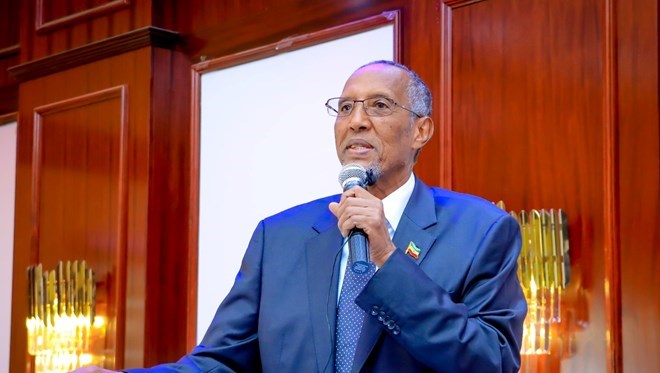
Hargeisa (HOL) – Somaliland President Muse Bihi Abdi said that peace and social cohesion in Somaliland have attracted the attention of investors, and improving the interior would lead to international recognition.
Speaking at the Brenthurst Foundation African Security Dialogue conference in Hargeisa on Sunday, President Bihi underlined that the people of Somaliland believe that peace is their top priority, which has attracted many governments and institutions to trust and invest in Somaliland.
advertisementsHe added that the Berbera project exemplifies peace and trust among Somaliland’s people.
“We believe that recognition can be achieved through improving our interiors, not externally. We don’t anticipate a government to recognize Somaliland as an independent. We believed in cleaning up our homes first to show the world that Somaliland can be trusted and worked with.” President Bihi is quoted as saying.
“In terms of politics, culture, economy, and peace, we aspire to be an example to most African countries, not only Somalis.” He added.
During the question and answers session, the President answers questions related to peace, economics, and democracy. Ugandan opposition leader and singer Robert Kyagulanyi Ssentamu, known as Bobi Wine, who is among the delegates invited to the conference, has asked the President why the SNM returned power to the people. Still, most other freedom fighters, such as Yoweri Museveni in Uganda, did not?
The President responded, “As SNM leaders, our first rule was to fight for independence and remove the stubborn leader, then we asked ourselves why are we fighting? Should the people decide their future, or should we, as leaders, make the decisions?
On May 18, 1991, Somaliland declared its independence from Somalia but has not received legal recognition from the international community.
Somaliland elections
The Somaliland Electoral Commission has completely disbanded following a dispute ahead of the controversial presidential election scheduled for November 13.
The three remaining commission members, including the newly elected chairman Kaltuun Sheikh Hassan Abdi, have submitted their resignation letters to the President of Somaliland on Saturday.
The chairman of the opposition UCID party said it is unfortunate the disbandment of the commission, and they will hold a meeting to save Somaliland and its security.
Somalia’s new president vows to beat back jihadists, then talk to them

Source: Economist, Friday June 3, 2022
An interview with Hassan Sheikh Mohamud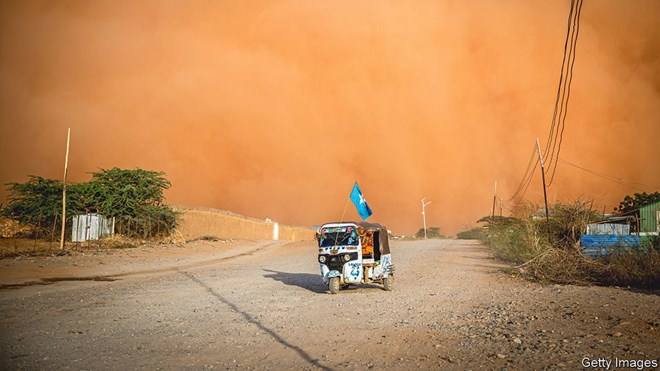
When Hassan Sheikh Mohamud entered Villa Somalia as president in 2012, his writ ran little farther than the sandbagged gates of the bullet-pocked, Italian-built, Art Deco palace of the head of state. Though the central government had recently wrested control of most of Mogadishu, the capital, and had recaptured some strategic towns here and there, vast swathes of the country’s centre and south remained in the hands of al-Shabab, a jihadist group with links to al-Qaeda.
Terrorist attacks were routine: just two days after his election, Mr Mohamud narrowly survived an assassination attempt. After two decades of anarchy and civil war, Somalia then looked less like a country than a gaggle of warring fiefs. “We started from scratch,” says Mr Mohamud of his first term as president.
advertisementsToday he finds himself in a similar position. On June 9th he will be sworn in as president again, the first time since independence in 1960 that a Somali has held the office twice. But since he handed over the reins in 2017 to Mohamed Abdullahi Mohamed, better known as Farmaajo, the country has slid backwards. Last year a crisis sparked by Farmaajo’s attempt to stay in office by delaying elections threatened a return to full-scale civil war. Though the outgoing president eventually handed over power peacefully, he left behind a country more divided, more diplomatically isolated and less secure than it has been for years. Many Somalis and their country’s foreign allies have welcomed the return of the seasoned Mr Mohamud as the man to fix the violent mess. Can he do so?
Speaking to The Economist in a heavily fortified hotel in Mogadishu, he says it was the sight of his successor ripping up the fragile gains of the previous decade that prompted him to run for office again. The populist Farmaajo sidelined the leaders of Puntland and Jubaland, two powerful regional states, and wangled loyalists into running the other three. He lashed out at critics and packed his cronies into the federal security forces, which then threatened to disintegrate violently along clan lines. Whoever has run Somalia, a labyrinth of clan loyalties has long prevented the emergence of a true sense of national unity.
Farmaajo upset foreign allies, too. He drew closer to Qatar and Turkey at the expense of other influential states in the Gulf. He picked fights with neighbouring Kenya and Djibouti. His cosying up to Eritrea and its vicious dictator, Issaias Afwerki, was particularly unpopular.
By contrast the avuncular Mr Mohamud, an academic and civil-rights campaigner, has a more conciliatory flavour. He has moved fast to mend bridges with opponents at home and abroad. Said Deni, president of Puntland, the oldest and strongest of the five federal states (excluding the breakaway would-be country of Somaliland), notes that one of Mr Mohamud’s first moves after winning the election was to invite all Somalia’s regional leaders to a meal together. He promised them he would share power and complete a new federal constitution. “It was a good speech,” concedes Mr Deni grudgingly (the two ran against each other in the election).
Foreign leaders have also rushed to support the new man. Kenya’s president is to attend the inauguration—a sign that diplomatic relations, so prickly under Farmaajo that they were severed entirely for several months, may be on the mend. “We cannot afford any outside enemies,” Mr Mohamud explains. Meanwhile America, which in February took the unusual step of banning visas for Somali officials who disrupted the electoral process, says it will send hundreds of troops back into Somalia to help the government fight al-Shabab. “[Mr Mohamud] is somebody we can work with,” says an American official.
But he can expect a rough ride. Al-Shabab, which was knocked back in his first term, is resurgent and still controls much of the countryside (see map). “Most of the districts we liberated have been lost again,” he laments. Though al-Shabab rejected the election, it may well have hoped that Farmaajo would win. On his watch it was widely believed that the jihadists had infiltrated state institutions, especially the security apparatus. “The previous government had no plan to fight al-Shabab,” says Mr Deni. The group has spread across the country. Few places are safe from the jihadists. To journey just a few hundred metres down the road from the international “green zone” by the airport to meet the president, your correspondent had to be accompanied by seven soldiers in a jeep and a mounted machinegun.
Al-Shabab is well entrenched in the territories it controls. Its people still extort cash from businesses and conscript children into their guerrilla units. They also run courts and provide basic goods and services. The new president says that al-Shabab today collects more tax revenue than the federal government does. Local businessmen say the group mediates legal disputes more cleanly and efficiently than the official courts. “They’ve established a state within a state,” says the president.
So does he have a coherent plan for fighting them? “To defeat al-Shabab the government must out-compete it on service delivery,” argues Ahmed Abdullahi Sheikh, a former commander of the Danab, an American-trained fighting unit. Mr Mohamud, a moderate Islamist with links to the Muslim Brotherhood, also stresses ideology. “Our vision is to take the Islamic narrative from al-Shabab and show the people that the state protects their faith. This means waging a multi-front war.”
That may be a bit glib. A lasting solution will probably also require negotiations with al-Shabab. During his previous term Mr Mohamud tried to win over defectors with promises of an amnesty, mainly in vain. Now he concedes that the battle will end at the negotiating table—but not yet. The last big offensive against al-Shabab was in 2019. Mr Mohamud says he intends to launch a new one, first to contain the jihadists, then to push them back deeper into the countryside. In theory talks could then begin. In practice this could take years. Al-Shabab has certainly proved resilient as well as ruthless.
Mr Mohamud’s previous term was a mixed bag. His cabinet was fractious and unstable. Corruption was especially rampant. Like his successor he failed to organise a direct election on time, settling instead for an indirect one whereby members of parliament were elected by delegates chosen by about 14,000 clan elders. He too was indirectly elected. This time, though, he comes armed with experience and a reservoir of goodwill. He will need to seize advantage of both. ■
Somalia: Challenges for a New President
Somalia: Challenges for a New President
Source: The International Crisis Group published on 31 May 2022 a commentary titled “A Welcome Chance for a Reset in Somalia” by Omar Mahmood.
The author looks at the challenges facing newly elected President Hassan Sheikh Mohamud and makes some suggestions for dealing with those challenges.
Labels: al-Shabaab, ATMIS, election, Ethiopia, foreign policy, governance, Hassan Sheikh Mohamud, Mohamed Abdullahi Farmajo, Qatar, Somalia, UAE
Causes of Drought in Somali Regions of Horn of Afric
Causes of Drought in Somali Regions of Horn of Africa
Source: The Rift Valley Institute published 3 separate accounts for the causes of drought in Somali regions of the Horn of Africa.
One is dated 1 April 2022 and titled “Drought in Ethiopia’s Somali Region and Cross-border Strategies for Survival” by Musafe M. Abdi.
The second is dated 24 March 2022 and titled “Bay and Bakool: How Somalia’s Breadbasket Turned into an Epicenter of Humanitarian Crisis” by Abdirahman Edle.
The third is dated 22 March 2022 and titled “What Are the Causes of Somaliland’s Drought Crisis?” by Ahmed M. Musa.
Labels: agriculture, drought, Ethiopia, food insecurity, Horn of Africa, humanitarian crisis, inflation, migration, Saudi Arabia, security, Somalia, Somaliland, urbanization
Djibouti invites Saudis to invest in Africa’s largest Free Trade Zone
Djibouti invites Saudis to invest in Africa’s largest Free Trade Zone

Source: Asharq Al-Awasat, Riyadh – Fatehrahman Yousif
Thursday June 2, 2022
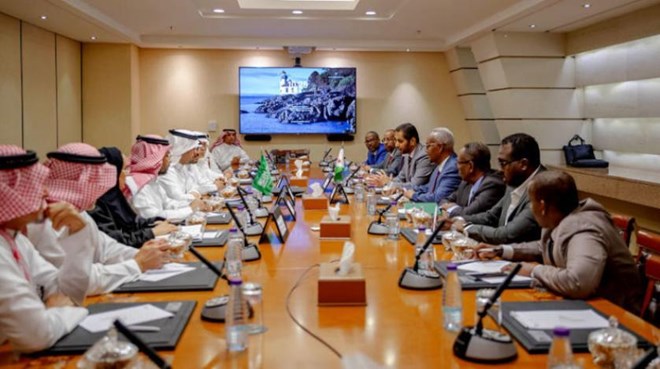
A delegation from Djibouti, led by Chairman of the Djibouti Ports and Free Zone Authority Aboubaker Omar Hadi, held talks with members of the Saudi business community at the Federation of Saudi Chambers in Riyadh on Tuesday.
Discussions tackled the economic and investment opportunities and means to double trade exchange between the two countries.advertisementsHadi called on Saudi entrepreneurs to invest in Africa’s largest free trade zone, which covers 48 square kilometers on the Red Sea, affirming the availability of an appropriate infrastructure to receive Saudi investments in various sectors
He pointed to its unique geographic location, which makes it a key network for economic and commercial exchanges at the African and global levels.
Hadi further referred to the Authority’s goals in the field of ports, logistics and free zones, noting that his country is a large gateway to an almost 1.3 billion population in Africa.
He underlined the country’s strategic location between trade routes of the East and the West, with over $2 trillion worth of goods passing through every year.
Djibouti has also maintained its currency rate at a fixed parity with the US dollar for over 40 years and enjoys a free currency exchange policy.
Djibouti Ambassador to the Kingdom Dya-Eddine Said Bamakhrama told Asharq Al-Awsat that the future of bilateral cooperation will expand to include strategic partnerships.
This could be achieved by benefiting from the integration of development programs in his country with the Kingdom Vision 2030’s programs and objectives, in light of the available investment opportunities and enhanced bilateral ties.
FSC Secretary-General Hussein al-Abdulqader lauded the historical ties between the Kingdom and Djibouti.
He underscored the importance of taking advantage of the available investment capabilities and opportunities to develop more commercial and investment partnership projects and raise the volume of trade between the two countries, which has reached about SAR7 billion ($1.86 billion) with a growth rate of 103% in 2021 compared to 2020.
There is still a great chance to raise this figure in line with the efforts made and the available investment opportunities, Abdulqader added.
US names new Horn of Africa envoy
US names new Horn of Africa envoy

Source: VOA, Thursday June 2, 2022
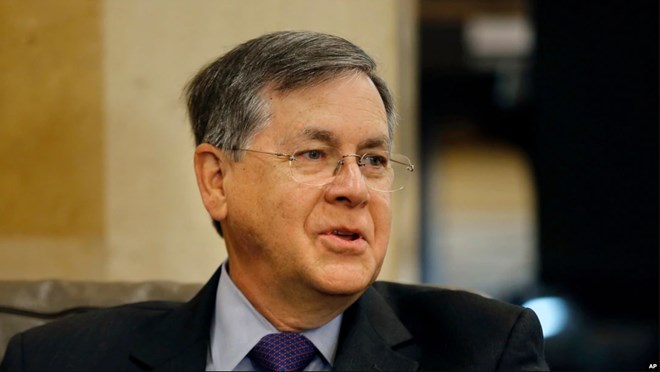
FILE – David Satterfield, then a U.S. deputy assistant secretary of state, is pictured in Beirut, Lebanon, March 5, 2019.
U.S. Secretary of State Antony Blinken on Thursday named career diplomat David Satterfield as the new special envoy to the troubled Horn of Africa.
Satterfield, 67, who has experience in the Persian Gulf states, Lebanon and Iraq, most recently has served as ambassador to Turkey. He is replacing Jeffrey Feltman, another veteran diplomat, who had held the Horn of Africa posting, covering the countries of Somalia, Djibouti, Eritrea and Ethiopia, since last April.advertisementsIn making the appointment, Blinken said, “Ambassador Satterfield’s decades of diplomatic experience and work amidst some of the world’s most challenging conflicts will be instrumental in our continued effort to promote a peaceful and prosperous Horn of Africa and to advance U.S. interests in this strategic region.”
The top U.S. diplomat said Feltman, 63, would continue to work at the State Department in an advisory capacity on African affairs.
In assessing his tenure in the Horn of Africa in November, Feltman pleaded for an end to the “violence, humanitarian catastrophe and atrocities in northern Ethiopia,” in the Tigray, Amhara and Afar regions.
The Ethiopian government has been at war with Tigray’s ruling TPLF party since November 2020.
“But we are also deeply concerned with violence and tensions elsewhere in Ethiopia,” Feltman said. “If not addressed through dialogue and consensus, these problems can contribute to the deterioration of the integrity of the state.”
Last month, the State Department also expressed concern about Somalia’s delayed elections and what it called “the procedural irregularities that have undermined the credibility” of those polls.
Prominent civil society leader passes away in Mogadishu
Prominent civil society leader passes away in Mogadishu

Source: Hiiraan, Sunday May 29, 2022
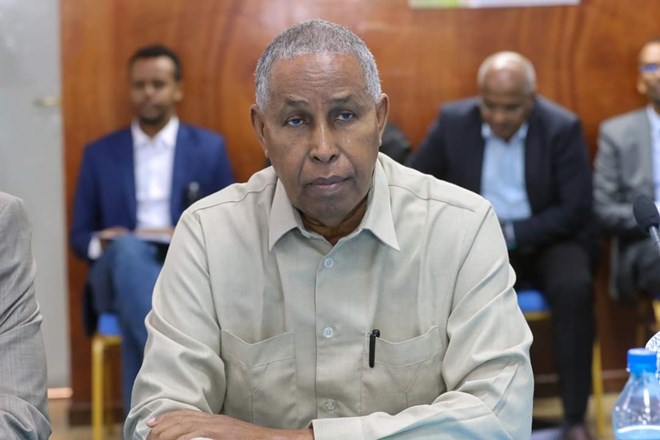
Mogadishu (HOL) – A prominent and well-respected peace activist passed away in Mogadishu on Saturday night, his family and friends have confirmed.
advertisementsAbdullahi Shirwa passed away in his home after a bout with illness. Shirwa had been a visible leader of Somalia’s civil society since the collapse of Somalia’s central government in 1991. He was the chairman and co-founder of the Somali Peace Line (SPL), a local NGO established in 1995 that worked on conflict resolution. He also was a member of the Civil Society in Action, an umbrella organization of over 12 groups in Mogadishu.
Reporters worldwide have called on Shirwa over the years to provide on-the-ground insight into the developments of Somalia’s post-war capital.
Following Somalia’s most devasting terrorist attack, the catastrophic Zobe bombing in October 2017 that killed close to 600 people, Shirwa sprung into action and led a team that collected $4.4M for children who became orphans in the wake of the bombing.
Most recently, he was working on a national drought response team.
Dozens of prominent Somalis have taken to social media to offer their condolences to Abdullahi Shirwa’s family, including Prime Minister Roble, who described Shirwa as a national hero who dedicated his time to serving his people.
“I ask God for patience and faith in his family and the people of Somalia he left behind and for him to make Jannatul Fardowsa his home.”
Somalia’s New Government and Al-Shabaab Challenge
Somalia’s New Government and Al-Shabaab Challenge
Source: The Associated Press published on 25 May 2022 an article titled “For New Somalia Government, Al-Shabab a Threat to Authority” by Rodney Muhumuza.
The article discusses the internal dynamics of Al-Shabaab and its continuing influence. Al-Shabaab’s strategy is to patiently wait for the departure of foreign troops.
Labels: al-Shabaab, charcoal trade, extortion, Hassan Sheikh Mohamud, peacekeeping, security, Somalia, taxes
President Hassan Sheikh thanks the UAE government for drought support
President Hassan Sheikh thanks the UAE government for drought support

Friday May 27, 2022
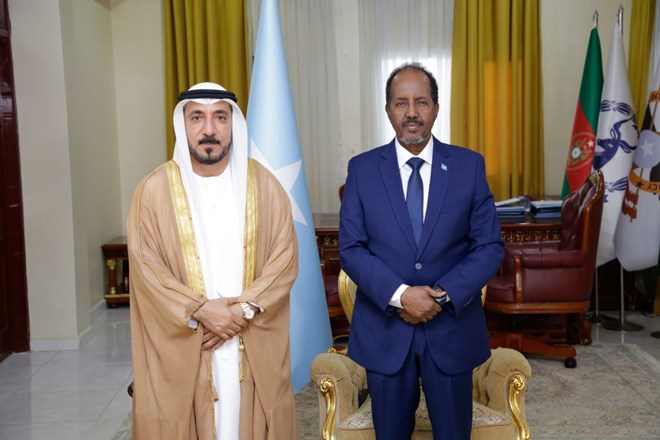
Mogadishu (HOL) – Somali President Hassan Sheikh Mohamud met with the UAE’s ambassador to Somalia, Mohamed Ahmed Othman Al Othman Al- Hammadi at Villa Somalia on Thursday, where he thanked the Emirati government for their donation of $9.6 million to assist with battling the crippling drought.
advertisementsSomalia’s Finance Minister, Dr. Abdirahman Beileh and PM Mohamed Hussein Roble participated in a handover ceremony with the UAE ambassador at the Central Bank of Somalia, where the nearly $10 million seized by Somali authorities at Adan Adde International Airport in Mogadishu in April 2018 was finally deposited.
At the time, Ambassador Mohammed Ahmed Othman Al Hammadi told reporters that the money was earmarked for the salary of UAE-trained Somali soldiers.
The seizure led to a more rapid deterioration of an already fragile relationship between the two countries.
In January 2022, Prime Minister Mohamed Hussein Roble publicly apologized to the UAE for the seizure and ordered the release of the funds. However, the outgoing president Mohamed Abdullahi Farmaajo ordered the central bank governor not to release $9.6 million in “illicit” money. It was formally returned to the UAE government last Thursday, just two days after Farmajo was voted out of office by lawmakers.
During the meeting with the UAE Ambassador, President Mohamud called on the international community to provide more support to the Somali government to better manage the drought, which experts have described as the driest season in 40 years.
President Mohamud appointed Abdirahman Abdishakur Warsame, a candidate in the latest presidential elections, as the special envoy for drought response in the country.
The UN estimates that the number of people affected by drought has risen to 6.1 million.
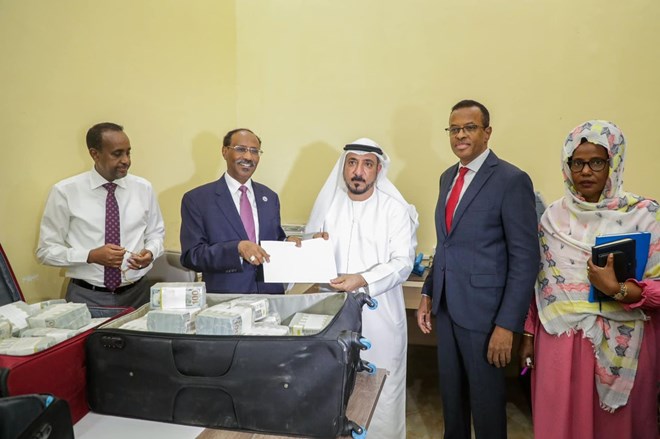
Somalia’s al Qaeda branch has gotten ‘Bigger, Stronger, and Bolder’ since U.S. exit
Somalia’s al Qaeda branch has gotten ‘Bigger, Stronger, and Bolder’ since U.S. exit

Source: Foreign Policy, USA, By Jack Detsch
Friday May 27, 2022
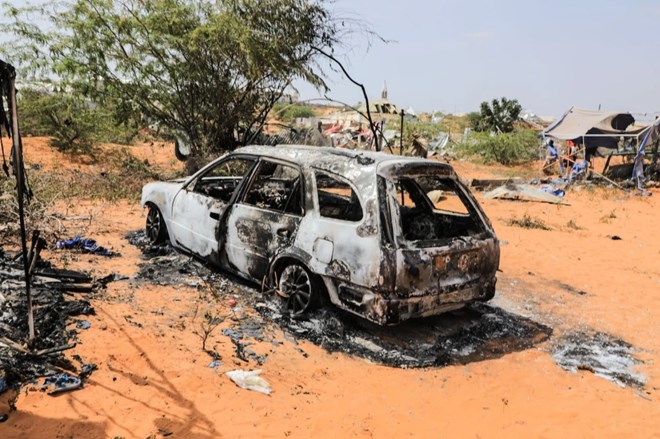
The remains of a police car following an attack by al-Shabab militants on a police station in the outskirts of Mogadishu, Somalia, on Feb. 16. HASSAN ALI ELMI/AFP VIA GETTY IMAGES
Somalia’s al Qaeda franchise has gotten “bigger, stronger, and bolder” since the small U.S. military footprint of 750 troops was ordered out of the country by then-U.S. President Donald Trump in late 2020, the Pentagon’s top military official for Africa said on Wednesday.
U.S. Africa Command chief Gen. Stephen Townsend told reporters at the command’s headquarters in Stuttgart, Germany, that the terrorist group al-Shabab had taken advantage of Somalia’s political dysfunction after the U.S. withdrawal to regroup and improve its capability to strike within the Horn of Africa region and overrun African nations’ forward operating bases. Now, after U.S. President Joe Biden’s decision to send troops back, which U.S. officials have described as a move to keep a consistent presence in the country to tamp down on the rising terrorist threat, the United States is making preparations to send just under 500 troops to try to reverse the tide.advertisementsBut al-Shabab’s ability to conduct complex attacks has grown due to the Trump-era hiatus, U.S. military officials believe. In early May, the terrorist group overran an African Union forward operating base in Somalia about 100 miles from the capital of Mogadishu, killing up to an estimated 30 peacekeepers in a tense firefight. And the group stepped up attacks ahead of this month’s elections—including a suicide bombing near the capital city’s airport that killed at least four people and wounded seven.
“In the last 16 months, since we concluded the repositioning out of Somalia, al-Shabab has gotten bigger, stronger, and bolder,” Townsend told Foreign Policy and another traveling reporter in an interview at Africom’s headquarters at Kelley Barracks in Stuttgart. “And we have seen them in recent months conduct attacks that they have not had the capacity to do in the last three years that I’ve been here.”
The lack of a U.S. presence on the ground has impacted Somali troops, too, despite the presence of an AU peacekeeping mission in the country. While Townsend wouldn’t say that Somalia’s military had become “less capable,” the U.S. general said the model of training needs on-the-ground partners to work.
“They haven’t moved forward. They need partnership to move forward,” Townsend said. “We’ve been commuting to work, and it’s less efficient and less effective.” U.S. troops left about a year after al-Shabab launched a complex attack on the Manda Bay Airfield in Kenya in January 2020, killing three Americans. The group’s attacks increased by nearly 30 percent after Trump’s withdrawal, according to one tally.
Despite the uptick in attacks from the terrorist group, Townsend said al-Shabab’s inability to disrupt Somalia’s elections in May was a “bright spot.” Townsend recently met with newly elected Somali PresidentHassan Sheikh Mohamud, who defeated the incumbent president in a parliamentary vote, ending a political crisis that had ensnared the country for over a year.
But al-Shabab, which Townsend called the “largest, wealthiest, and most lethally active arm of al Qaeda,” continues to reiterate that it desires to attack the U.S. homeland. The Pentagon does not believe that al-Shabab has the capabilities to match its ambitions just yet, but it has the ability to strike in the Horn of Africa, killing almost 150 people in an attack on Kenya’s Garissa University in 2015 and staging a truck bombing in Mogadishu in 2017 that took almost 600 lives.
In early May, the group released a video calling for lone-wolf attacks in the United States and jihad against Americans and Westerners globally. “That’s only a couple of weeks ago,” Townsend said. “So clearly they have the intent, and they’re saying it loudly and publicly, and we should pay attention.”
Townsend said that in 2019, the United States uncovered a plot where al-Shabab was more than two years into training two commercial pilots for possible attacks inside the United States. And in the aftermath of the probe, Townsend, who retires soon, is left with more questions about al-Shabab’s efforts.
“I’m wondering, one, did we disrupt the entire plot? Were there more than the two pilots we discovered?” he said. “And two, what other plots have been out there for two and a half years that we don’t know about?”
Jack Detsch is Foreign Policy’s Pentagon and national security reporter. Twitter: @JackDetsch
WATCH: UN Security Council extends mandate of UN Assistance Mission in Somalia
WATCH: UN Security Council extends mandate of UN Assistance Mission in Somalia

Source: Hiiraan Onine, Friday May 27, 2022
https://www.kaltura.com//p/2503451/embedPlaykitJs/uiconf_id/49754663?iframeembed=true&entry_id=1_hubcgmu9
Mogadishu (HOL) – Somali Ambassador to the United Nations Abukar Dahir Osman (Baale) welcomed the adoption of the resolution that renewed the United Nations Mission in Somalia (UNSOM) mandate for another five months, until October 31, 2022.
advertisementsThe resolution was unanimously adopted by the 15-member council, which requested that UN Secretary-General António Guterres inform Security Council members regularly through oral updates and written reports every 90 days.
Abukar Dahir Osman welcomed the unanimous adoption, saying, “this is the moment for the international community to renew its commitment to the Somali people and, at the same time, to strengthen coordination and consistency in the efforts among different entities and agencies of the United Nations.”
He noted that despite the tangible gains made in recent years, its mandate and activities are increasing disproportionately, adding that the mission can do little to address the evolving political and security developments. Osman said that Somalia looks forward to working with the Department of Political and Peacebuilding Affairs to review the current mandate.
Osman outlined three considerations that would guide Somalia during the Secretary-General strategic review process:
First, we stress that in formulating options for the future United Nations presence, it must be led by the needs and expectations of the Somalis and their leadership. The review must take into account the need for national ownership and must always be aligned with national priorities. The Somali Government is now in a position to articulate those priorities and lead the discourse.
Second, in the process of the review, it is important to identify clearly defined, measurable and realistic benchmarks to track UNSOM’s timely execution and achievement of its tasks while reducing fragmentation to advance efficient and effective delivery. Furthermore, the “end state” must be clear, encompassing a common understanding and shared vision of the roadmap for the transition from Special Political Mission to United Nations Country Team.
Last but not least, the international community must remain strongly committed to the sovereignty, territorial integrity, political independence and unity of Somalia. The United Nations presence should be geared towards safeguarding territorial integrity and federalism in Somalia. Different interpretations and discussions of federalism in terms of power-sharing or revenue-sharing among Somalis in different regions should not alter the UN shared commitment to a strong and united Somalia. It is also crucial that all necessary efforts continue to be undertaken to implement measures against the internal and external actors attempting to undermine the peace and stability in the country.
Osman said that Somalia looks forward to the review and trusts that the UN will consider Somalia’s progress, underscoring the essential need for the United Nations to “work in a spirit of collaboration and synergy” with Somalia.
The UN Security Council authorized the mission to Somalia in June 2013, acting on the recommendations of then-United Nations Secretary-General Ban Ki-moon to advance peacebuilding and state-building in governance, security sector reform and the rule of law.
President Hassan Sheikh Mohamud promises direct vote in 2026
President Hassan Sheikh Mohamud promises direct vote in 2026

Source: Hiiraan Online, Friday May 27, 2022
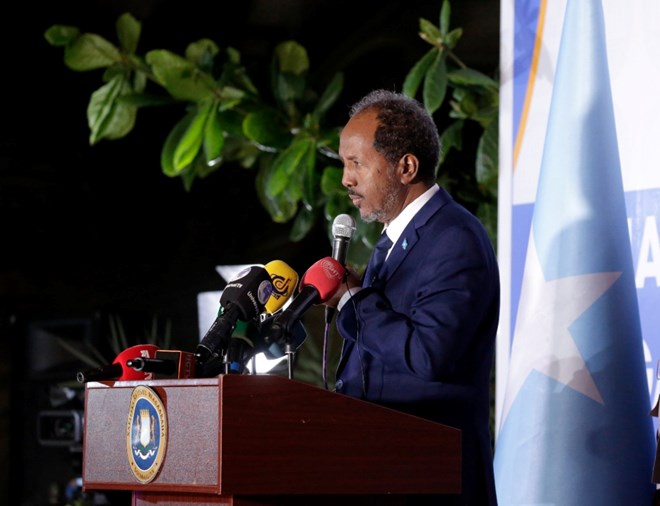
Mogadishu (HOL) – Somali President Hassan Sheikh Mohamud promised a nationwide election in the country in 2026, promising not to return to the Afisioni airport, where the last two indirect elections were held.
Speaking at an event in Mogadishu on Thursday night that discussed the challenges of this month-long electoral process in which he was elected on 15 May, Mohamud said that while what had happened could be forgiven, it would not be forgotten as a lesson.
advertisementsHe also promised to take governance from regional capitals to the district level, where people can elect their local representatives. He requested the people support the process.
He added that if the Somali people are given the opportunity, they can elect good leaders who can implement democracy to the people’s satisfaction.
Mohamud, who was voted out of power in 2017, was re-elected by Somalia’s parliament on 15 May in Mogadishu, defeating the outgoing president Mohamed Abdullahi Farmaajo in indirect elections.
Somalia has not held a popular election since 1964.
International community urged to support new administration in Somalia
International community urged to support new administration in Somalia
Source: UN, 23 May 2022Africa
The recent conclusion of the electoral process in Somalia offers a long-awaited opportunity to make progress on other urgent national priorities, the UN Special Representative for the county told the Security Council on Monday.
Time is short for Sudan to resolve political crisis, Mission chief warns
Time is short for Sudan to resolve political crisis, Mission chief warns
Source: :UN, 24 May 2022 Africa
Time is short for Sudan to reach a solution to its protracted political crisis, the Special Representative for the country told the Security Council on Tuesday, warning that if the impasse is not urgently overcome, the consequences will be felt beyond national borders, impacting a whole generation.
Ethiopia: Widespread Arrests in Amhara Region
Ethiopia: Widespread Arrests in Amhara Region
Source: The Associated Press published on 23 May an article titled “Ethiopia Launches Crackdown on Journalists and Activists” and Reuters a similar one titled “Ethiopia Arrests 4,000 in Amhara Region Crackdown, Local State Media Report.”
Ethiopia reportedly arrested thousands of journalists, activists, and Fano militia members in Amhara region to “ensure the survival of the nation.”
Labels: Abiy Ahmed, Amhara Region, Ethiopia, Fano militia, human rights, journalists
US Government Urges US Companies to Avoid Doing Business with Sudanese State-Owned Enterprises
US Government Urges US Companies to Avoid Doing Business with Sudanese State-Owned Enterprises
Source: The U.S. Department of State, Department of the Treasury, Department of Commerce, and Department of Labor issued on 23 May 2022 an advisory titled “Risks and Considerations for U.S. Businesses Operating in Sudan.”
Following the seizure of power by Sudan’s military on 25 October 2021, the military is in effective control of all state-owned enterprises (SOEs), of which there are at least 650. The advisory warns that investing with, forming partnerships, or facilitating the expansion of SOEs and military-controlled companies in Sudan may entail reputational risks for U.S. businesses and individuals.
This advisory relates specifically to SOEs and military-controlled companies. The U.S. government does not seek to curtail or discourage responsible investment or business activities in Sudan with civilian-owned Sudanese counterparts.
Labels: business, child labor, corruption, Darfur, gold, human rights, military, sanctions, SOEs, Sovereign Council, Sudan, US
AU: Focus on root causes of conflict, political instability
AU: Focus on root causes of conflict, political instability
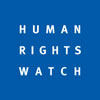
Source: Human Right Watch, Wednesday May 25, 2022
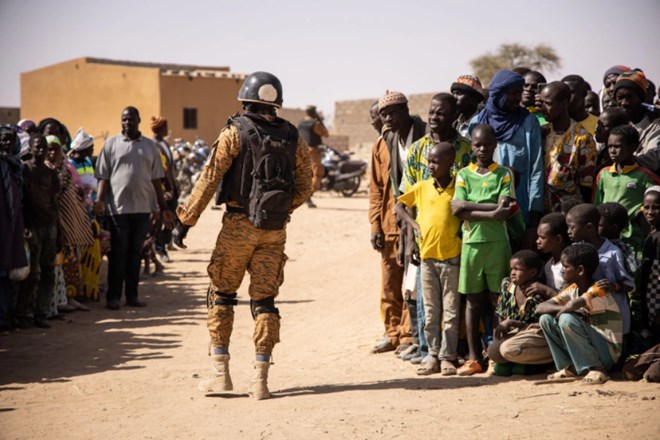
(Nairobi) – African Union (AU) member countries should use their upcoming summit to commit to addressing human rights issues underlying armed conflict and political upheaval on the African continent, Human Rights Watch said today. The Extraordinary Summit on Terrorism and Unconstitutional Changes of Government will take place on May 25-28, 2022, in Malabo, Equatorial Guinea.
The AU summit is taking place within the context of five coups in Africa since 2021, and Islamist insurgencies in Cameroon, Central African Republic, Mozambique, Somalia, and the Sahel, as well as widespread impunity for human rights violations by government security forces. The summit is scheduled to begin on Africa Day, which commemorates the founding of the Organization of African Unity, the AU’s predecessor, in 1963. The summit is an opportunity for the continent’s leaders to address continuing political repression, entrenched impunity, disregard for constitutional term limits, and election rigging.advertisements“The AU summit should follow up on its February pledges by analyzing the links between human rights abuses and insurgencies and coups in Africa,” said Carine Kaneza Nantulya, Africa advocacy director at Human Rights Watch. “African leaders cannot afford to avoid addressing how impunity for atrocities committed by their security forces is creating grievances that fuel recruitment by extremist groups.”
In the Sahel, responses by governments and their Western partners need to go beyond the security dimensions of the crisis and consider the underlying deep-rooted social and political factors, Human Rights Watch said. Over the past decade, the United Nations, Human Rights Watch, and other nongovernmental organizations have documented thousands of unlawful killings and other abuses of civilians and suspects by the security forces of Burkina Faso, Mali, and Niger during counterterrorism operations. Governments have yet to deliver justice to victims and their families.
Many atrocities appear to be in retaliation for the deaths of soldiers during attacks by armed Islamist groups. Leaders in Malabo should deliberate about building and strengthening rights-respecting counterterrorism operations with built-in human rights monitoring and reporting systems, and commit to strengthening judicial institutions to investigate, and fairly prosecute, alleged violations.
“The AU needs to recognize that government abuses are a key driver of endemic crisis that require bold approaches,” said Kaneza Nantulya. “Human rights ought to be firmly at the center of regional solutions for the Sahel and other crises.”
The AU should cooperate with the African Commission on Human and Peoples’ Rights (ACHPR), to increase the presence of human rights officers in African-led counterterrorism missions. Governments need to ensure that cooperation agreements on counterterrorism operations set out human rights standards, such as the UN Human Rights Due Diligence Policy.
The AU should call for meaningful and effective security sector reform efforts in conflict-affected countries and take concrete measures to improve security force compliance with international human rights and humanitarian law, and their progress on the protection of civilians. These measures should include establishing civilian oversight bodies and vetting mechanisms to remove members implicated in serious human rights abuses from security and intelligence services.
The members also need to address democratic deficits and issues around corruption, impunity, term limits, and the need to hold free and fair elections, which have undermined development and encouraged changes of government that deny citizens the right to choose their leaders.
In Sudan, since the October 2021 military coup, security forces have arbitrarily detained hundreds of protesters and forcibly disappeared scores of others as part of a broader clampdown on activists and civil society opponents of the coup. Security forces have targeted protesters, including children. AU leaders’ engagement with Sudanese leaders on resolving the crisis should fully consider demands by protesters and the broader civic community, such as ensuring systemic reforms, including within the security forces, prioritizing justice for past and recent abuses, and the establishment of civilian rule.
In Chad, the human rights situation, particularly the rights to freedom of assembly and expression, has worsened since the unexpected death of President Idriss Déby Itno in 2021, and the takeover by his son, Mahamat Idriss Déby Itno.
“The AU should urge military leaders in Chad and Sudan to end the killings, enforced disappearances, and arbitrary detention of protesters and activists,” Human Rights Watch said. The authorities should respond to citizens’ demands for ethical leadership, civilian rule, economic security, and demonstrate greater respect for the rights to freedom of expression, association, and assembly.
Almost 60 years ago, in establishing the Organization of African Unity, African leaders decided to anchor their vision of human dignity and freedom within a pan-African institution, now the African Union. As African leaders reflect on the many gains since 1963, they should pay close attention to and respond to emerging forms of state-sponsored repression: the use of mass surveillance equipment, hampering of humanitarian access, deliberate internet shutdowns and denial of access to information.
“The AU should urgently address the increasingly ruthless repression of dissent and political opposition by autocratic governments that is fueling political crises across Africa,” Kaneza Nantulya said. “The AU should take steps to reverse these trends that constitute serious reversals of hard-won progress on justice, accountability and the rule of law and act accordingly. If not, those who, like OAU founder Julius Nyerere, argue that the AU is a club of autocrats and not an institution of the African people, will be proved right.”
Finland and Sweden formally apply for NATO membership
Finland and Sweden formally apply for NATO membersh

By Emily Rauhala
Source: Washington post, Wednesday May 18, 2022
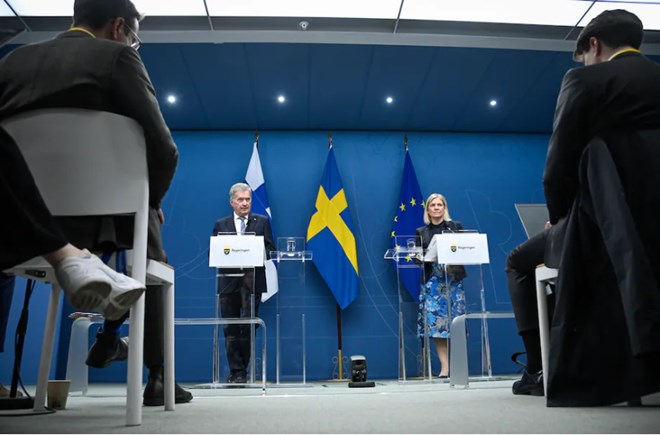
BRUSSELS — Finland and Sweden submitted letters Wednesday formally applying to join NATO, a historic moment for two countries that held fast to military nonalignment until Russia’s invasion of Ukraine upended their thinking about security.
The delivery of the letters to the alliance’s Brussels headquarters marks the start of an accession process that could take months but is expected to result in an expansion of NATO from 30 to 32 members, remaking Europe’s post-Cold War security architecture.advertisements
“I warmly welcome the requests by Finland and Sweden to join NATO,” Secretary General Jens Stoltenberg said at a news conference in Brussels with ambassadors from each country. “You are our closest partners, and your membership in NATO would increase our shared security.”
Stoltenberg called the applications a “historic step” and said allies will now consider next steps.
Swedish Prime Minister Magdalena Andersson and Finnish President Sauli Niinisto of Finland are scheduled to appear Thursday at the White House, where President Biden is expected to show his support.
NATO officials and several allies have signaled that Finland and Sweden could expect protection in the period before their membership is fully ratified and they are part of NATO’s collective defense pact, known as Article 5.
A big question is whether Russian President Vladimir Putin will retaliate. European officials and diplomats said Finland and Sweden are prepared for hybrid or clandestine attacks.
Putin cited the threat of NATO expansion among the rationales for his unprovoked invasion of Ukraine. Kyiv is not on track for NATO membership, but Putin’s war has resulted in a reinvigorated alliance that is now poised to double its land border with Russia.
The two new members would bring NATO’s full force to the far north and bolster its presence in the Baltic Sea region. The alliance would gain two sophisticated militaries with deep experience operating near Russia’s frontier. Sweden also holds the strategically important island of Gotland, just 200 miles from the Russian military in Kaliningrad.
Finland and Sweden didn’t consider themselves neutral before now. Militarily, they have been close NATO partners. Politically, they are members of the European Union.
But thinking of themselves as nonaligned militarily has been an important part of their self-conception. Before Russia’s invasion of Ukraine, a majority of people in both countries said it was safer to be outside NATO. But the past months have seen a dramatic swing in public opinion.
“We are leaving one era and beginning another,” Sweden’s Andersson said Monday, announcing the decision.
“This is an extraordinary development given where we were in February,” said Anna Wieslander, director for Northern Europe at the Atlantic Council think tank.
“Russia wanted to turn back time, to go back to the Cold War, to fragment and weaken the West,” she continued. “Now, in May, we are here.”
After receiving the applications, NATO will convene its decision-making body, the North Atlantic Council, to decide whether to move forward with the request. Then there will be accession talks, said a NATO official who spoke on the condition of anonymity according to the alliance’s ground rules.
This first phase of the accession process is expected to be swift, largely because both countries are already close NATO partners. From there, it could take “months” for each member state to ratify the decision, the official said.
Turkish President Recep Tayyip Erdogan voiced skepticism last week about Sweden and Finland’s accession, but NATO officials and analysts say Turkey will fall in line. “We are determined to work through all issues and reach rapid conclusions,” Stoltenberg said Wednesday.
Russian officials have warned of “consequences” at every step but have offered more muted rhetoric in recent days.
Putin said Monday that Finland and Sweden’s entry into NATO did not represent an imminent danger to Russia, but he warned that a military buildup in either country could change that assessment.
“Russia has no problems with Finland and Sweden, and in this sense, expansion at the expense of these countries does not create an immediate threat for us,” he said in televised remarks on Monday. “But the expansion of military infrastructure into this territory will certainly provoke our response.”
“What it will be, we will look at based on the threats that will be created for us,” he continued. “We will respond accordingly.”
In a weekend telephone call, Putin told Finland’s Niinisto that the decision to join NATO was “wrong” and could have “a negative effect” on Russian-Finnish ties, but he did not make specific threats, according to accounts of the call.
NATO and European officials have for the most part downplayed the risk of significant Russian aggression.
The country’s military remains tied up in heavy fighting in Ukraine and has lost soldiers and equipment. Russia also withdrew troops from the border with Finland to fight in Ukraine, leaving Moscow with a reduced capacity to target the border militarily.
Given widespread support for the Nordic countries’ NATO accession, it will be difficult for Russia to influence their populations.
“There is no place to intervene, there is no ground to make people change their minds,” said Henri Vanhanen, a foreign policy expert and adviser to the center-right National Coalition Party in Finland. “This is the democratic resilience we have against Russia.”
“It is out of Russia’s reach right now to try to stop Finland and Sweden from joining NATO,” he said. “It has to come to terms with it.”
If Putin does try anything, allies have pledged support. Britain, Denmark, France, Iceland and Norway are among countries that have promised military support should either Finland or Sweden come under attack. “Whoever would seek to test European solidarity by threatening or attacking their sovereignty, through whatever means, must be certain that France will stand shoulder to shoulder with Finland and Sweden,” according to a French statement released Monday.
